

Book Reviews
|
|
"Tommy" by Richard Holmes. Reviewed by Tony Ratcliffe Over the last forty odd years I have been reading books on the Great War and this one , is one of the very best . In one chapter the author has taken the revolutionary view that British Generals were not as callous as we have been led to believe , and certainly not rear echelon cowards , pointing out that fifty eight were actually killed at the front. The chapter on the men shot at dawn is comprehensively and sympathetically covered, his only omission was not to investigate the " Field Police ". It finished with two heart rending items . At the wars end The Australian Light Horse , when learning they could not take their mounts home , held a horse race and then shot them , rather than leave them for probable miss-treatment. Finally, the soldiers in the U.K. so badly let down by their politicians , forced to pawn their medals to feed their families , would turn up at re-union and remembrance services wearing the pawn tickets pinned to their left breasts .
|
|
|
The Men Who Persevered The
first Australians committed to serve in Viet Nam were a group of
military instructors known as the Australian Army Training Team
Vietnam. Their initial role was to assist in the training of the ground
forces of South Viet Nam. But battalion battles and artillery duels,
the relief of besieged camps, and mobile strike forces became part of
the mosaic that saw this curiously named unit forge a distinct chapter
in Australia’s military history. The Men Who Persevered is the
story of their war. |
|
|
The
War of the Running Dogs by Noel Barber This book is the first one that I have read
(other than the book I have about 28 Brigade) about the emergency and
covers the time from 1947 to 1960. I found it so readable and so
full of the type of details which
interest me. I was interested in the personalities and how the situation
affected the ordinary Malay in the street. Sam used to tell me things
about the Communists and what happened when he served with the S.A.S in
Malaya. Some of the things that he told me were not of course mentioned in
this book. They were immeasurably cruel to the ordinary people and one
could not really blame the poor person in the kampongs for giving in to
the Comms and letting them have food. These communist fighters were utterly devoted to the communist cause and some of the
leaders were well read men who were grudgingly admired by a few British
powers that be. One of them was a big fan of Shakespeare and he took his
copy into the jungle with him. Why they were allowed to live when they
surrendered is something else and not only that, given large sums of money
as a reward. Chin Peng is still alive (as far as I know) But they had to
encourage them to surrender I suppose and this was the only way to be able
to set them up for life after they had surrendered. Another big factor in my enjoyment of this book
was that there were no gung ho Americans (well there was an American
running a mine) abseiling in and showing us how to win this long war. It
might have been a rather difficult feat to abseil in though given the
terrain. One American tin miner did remark when he was watching the
celebration parades in KL at the end of the emergency in 1960 -
that Winston Churchill’s picture should have been up there along
with the Tunku’s and I was quite pleased at reading that coming from an
American. |
|
|
Mud, Blood and Poppycock This a book by an ex Gurkha Officer...as it says on the cover. ''This will overturn everything you thought you knew about Britain and the First World War''....and agrees with Tony's views on British General's in Tommy. The British Troops were rotated into the front line on a regular basis and consequently morale and discipline was unbroken even in 1918. This was unlike the French who kept their troops in the front line until they were exhausted, resulting in a lot of mutiny's. Overall it is well researched, takes a bit to get into it but it is well worth the time spent getting into it. Certainly changed my views on WW1.... cheers Ern |
|
|
The Dragon Riders I don't usually read books written by women, but I'm glad I made the exception for this one . This is a good solid read of seven hundred plus pages. Apart from just a good story covering forty years of Indo China's history I learnt of the intricacies of the opium trade , the French and Operation X, and how opium money funded the Bhin Xuyan and other factions leading to the turmoil of the South's politics. Near the end there's a couple of pages of romantic slush that nearly makes you vomit , but don't be put off , you can skip them. |
|
|
The Soldier's Story Doc has told me about this book but it is not available in the UK. He says it is a book about D. Coy 6 RAR in Vietnam and tells the story of the battles from a soldiers point of view. I can't find a longer more detailed review on Google but I found this short review on alltheweb.com. This detailed account of Australia's major Vietnam battle and its aftermath has been written by one of the participants, and his story reconstructs the action using secret documents as well as the recollections of many diggers. The battle at Long Tan was a textbook nightmare in the history of jungle warfare. |
|
|
All Guts and No Glory Taken from a review on the internet The
climax of this book is an account of the Battle of Long Tan, which is
told here by the most senior ranking Australian soldier to survive the
battle. |
|
|
Tanamera by Noel Barber This
is a mammoth read, abut 736 pages, and an enjoyable one. I particularly
liked the references to places and areas of Singapore that I know well.
It is about a family called the Dexters and their experiences and
changing fortunes before the war, during and after. The patriarchal
figure in the family is Grandpa Jack who came out from Hull to make his
fortune in rubber, tin and anything else he could turn his hand to. He
was also a great one for the ladies. |
|
|
Sahib
I bought this book on the strength of
" Tommy" by the same author. It has a stronger theme
running though it which is the History of British India up to 1914. This
book will answer all questions on all achievements both military and
commercial and it depends on your point of view what your conclusion may
be . The main players , as human beings can not be admired as they were
mainly there to " shake
the pagoda tree" , you will be astounded to learn that over two
million Britons died there during the time of British India. Even though the author , as usual , is sympathetic to the rank and
file , this book does not leave the reader with the feeling of pride and
affection as "
Tommy" . |
|
|
The Red Sailor by Patrick O'Hara Who remembers reading this book in ' 67 ? It was passed around all the rooms. For those who can't remember it is the story of James Varne, ,just after WW2 straight out of the Catholic Protectory and into the Imperial Navy, which he immediately declared war on. The author has the knack of capturing the time and the place exactly, the time the early fifties, the place, The Far East. The story, I'll leave for now . It took me thirty years to acquire this book again and I had to pay thirty two quid on Ebay for a three and sixpenny paper back, but I'm glad I did.
|
|
|
Sinister
Twilight by Noel Barbour It has taken me quite a while to read this book because there were so many names, dates and happenings that I had to go back and check my facts a few times. The book tells the story of the Fall of Singapore from the beginnings of the Japanese advances up until the aftermath and post internment in Changi. The events up to the actual invasion by the Japanese were a catalogue of mistakes, lack of communication and, as a result, many people died, (mainly civilians) because of them. An example of lack of communications was an order which came through saying that 1000 bicycles had to be commandeered. The bicycles were gathered in and then it was realised that only 100 were actually needed and used. There fore there were many civilians minus bikes and a pile of unwanted ones. I have thoroughly enjoyed it but I am simply astounded at the total blunder that was the Fall of Singapore and mainly the fault of the British. There were clashes of authority and personalities and
unbelievable mistakes made. General Percival, was the one person most
responsible for the cock up and he died a broken man in the sixties. Many
of the personalities- military and civilian lived through it all and were
still alive in the late sixties when this book was written.
|
|
|
Old Soldier Sahib by Frank Richards Frank Richards was the author of 'Old
Soldiers Never Die', rated to be the finest First World War book written
by an Other Rank. In 'Old Soldier Sahib', he recounts his time as a
regular soldier before the war. He spend nearly all his service in India
with the Royal Welch Fusilers and although the events and sketches he
writes about took place half a century before our time in the tropics,
it's very easy to identify with them. His story of trying to sniff out whether the
barrack room mess urn had been used to other purposes is a great joy to
read as are his tales of the regiment on the march through India from one
cantonment to the next. There's also the soldiers' macabre humour that
comes out, for example, how if one of them died, not unusual in those
days, the regiment would turn out for his funeral- thus if some poor soul
was in a bad way and might cause the loss of Wednesday afternoon sports
day, the whole unit would be hoping that he would expire on the previous
day or linger on until Thursday rather than miss out on their half day
holiday. Re-reading the book after many years, it
comes as a bit of a shock to learn how the soldiers looked down on the
locals and how they treated them-but that was how it was. The book is
still banned in parts of India but that may be due to the story of one
soldier upsetting the locals by getting too amorous with their sacred cow
as much as the books attitude towards the native population. The book is also spiced with history, the
origin of the Flash, the black ribbons worn on the back collar of the RWFs.
the origin of the term 'doolally' and tales of life on the North West
Frontier. No easy to track down but the book is a good read which anyone who has served East of Suez can relate to.. |
|
Kokoda by Peter Fitzsimmons This is an Australian book and is not widely available in the UK. This WW2 book set in New Guinea follows in the footsteps of the heroes and villains of the campaign, from the inexperienced but brave men of the 39th Battalion at the frontlines to the imperious general like Macarthur and Blamey (Aust). it brings to the fore the fact that these unlikely soldiers stopped the Japanese advance to Port Moresby, in fact they prevented the Japanese from invading Australia. |
|
|
|
THE WAR LORD by Malcolm Bosse This is an Australian book and is not widely available in the UK except on Ebay where I saw a copy for £1.35 with postage at £2.40. This is an outstanding story in the tradition of Shogun, it is set in China between the end of WW1 and the start of WW2. The facts blend with the fiction, missionaries, gun runners, whores, Mongols and the Chinese peasants |
|
|
The Flame & The Fury by John Brinnand The scene is Chinese occupied Tibet, and it is set in the 1960s. This is a country whose plight has been largely overlooked by the rest of the world. Onto the scene comes an Anglo Indian bush pilot called Kaboom. |
|
|
The Four Sergeants by Zeno
This is a story about the Paras, dropping into Italy during ww2. It is very factual book and a super read. A must for all ex Para's to read.
|
|
|
A Star Called Henry by Roddy Doyle
Roddy Doyle I thought was a comedy writer, The Commitments , The Van, The Snapper etc and I got this book on the strength of those . The book starts with a description of the ghastly poverty of Dublin in 1902. The first chapter is written in such a depressing Dickensian way that I stopped reading it. Only a bollacking from my wife (" spending money on books and not reading them etc ") got me going again. The main character, Henry is the son of a one legged whorehouse bouncer . We follow his life as he progresses from Street Arab to member of the I.R.A. The Easter Rebellion when they take over the G.P.O. and then find out they have to pay some fierce women their pensions . The defeat , then the Irish war of Independence and finally The Civil War. Not the best time in Irish history for a comedy writer to deal with, but the comedy does come out in the dialog of the rich supporting cast. An excellent book , after the first chapter I couldn't, put it down , not since Catch 22 have I read such a different and enjoyable book . I look forward to his next offering .
|
|
|
In
a Sunburned Country by
Bill Byrson Good fodder for both Pommes and
Aussies. Good for Pommes in providing a great introduction into what
to expect when visiting Oz, with regards the land, its topography and
geography, plus its flora and fauna (much of which the author asserts
could kill you—crikey!). Good for Aussies in that Bryson has a
great way of informing you about everything you should know about the
place you live in, but never knew and probably never will if you don’t
read this book (assuming you don’t forget it straight away). In
“A Sunburned Country” is not strictly a travel book in the true sense
of the word, but it does describe Bryson’s travels around Australia and
he peppers it with interesting and frequently funny observations that
keeps the reader turning the pages. Byrson is an American, but,
lived in the UK for most of his adult life (ended up in Yorkshire) and
recently returned to the US. I never had a desire to go to Australia
before reading this book; my view too coloured by my 208 years that made
me believe that all Pommes would be set upon on arrival at Sydney airport
and soundly thrashed. But, have decided that I could and would like to do
it, now that I have an American accent (at least a passable one) and could
get around without being branded a Pomme!
|
|
|
The Magic Army by Leslie Thomas It is set during ww2,the trials and
tribulations of the Yanks and the locals getting along. Lot's of humour and
pathos. A great book
|
|
|
The Eagle and the
Snake by Douglas Boyd This is the story of an unbreakable code to the
legion and to others. But then Raoul Duvalier betrayed that code. Already
crippled, tortured and starved by the Viet Minh, he is court martialled
byt the Legion, disgraced and repatriated to France with no job and no
prospects, except the prospect of revenge. For 20 years he has known of, and not betrayed,
the where abouts of the Foreign Legion's gold. Now recruiting a private
army from the legion itself, he sets out to claim it for himself. But this
time one of his men has betrayed him. Imprisoned in his own dungeon, Raoul reviews the lives of recruits, relatives and lovers - then 2 decades of action and adventure from Algeria to Idaho, Belfast to Vientienne, the Dordogne to Dien Bien Phu - as he tries to identify the traitor. A traitor whose unmasking depends not just his gold but his life, and the lives barely yet begun. |
|
|
SAS Behind Enemy Lines This
regiment engage in the never ending pursuit of excellence. They
maintain the highest standards of self discipline in all aspects of
daily life. All ranks to possess humility and humour. |
|
|
Goodbye Mickey Mouse by Len
Deighton
This novel takes place in England in 1944 and it is a multi dimensional picture of what it is like to be at war and in love at that time. Len Deighton researched this novel for 6 years and it is a truly astonishing recreation of the time and place in minute detail. The only way you could know more about flying a P-51 mustang, after reading this book, is to have flown one. |
|
|
The Deadly Element by Lennard
Bickel
This book is described as a stupendous piece of work by one reviewer about the men and women behind the story of uranium. |
|
|
The Loves & Journeys of
Revolving Jones David Jones, conceived on a church pew on Armistice Night 1918, is brought up by his Auntie Blod and Uncle Griff in South Wales, his mother being too busy with her own affairs. His life as a merchant seaman becomes a search for adventure, and also for love. |
|
|
Arrivals and Departures
The village of Bedmansworth, close to Heathrow, has been there for six centuries. This is a tale of people who inhabit interconnecting worlds: the bustling, stress-filled, ultra-modern world of the airport and the still romantic, conventional world of the country village on its doorstep.
|
|
|
A Season in Hell by Jack
Higgins |
|
|
The Complete McAuslan by George MacDonald Fraser The Complete MacAuslan comprises of The General Danced at Dawn, MacAuslan in the Rough, The Sheikh and the Dust Bin. This is a collection of short stories about a Highland regiment in the Middle east just after WW2. I was first attracted by the sub heading " The Dirtiest Soldier in the World " . We'll see about that, I thought, but Private MacAuslan has even me beaten. This is military humour at it's best by the author of the Flashman books, who served in WW2 in 17 Div. So is one of the lads.
|
|
|
Rules of Engagement by Brian
Freemantle
Four men became heroes in 1975. Their mission was to rescue Vietnamese orphaned children born to GI's and local women. They had to do this before the Vietcong could reach them. Of the four children one is now millionaire businessman, one is an American highly decorated veteran. One is running for the presidency of the USA and one is dead, leaving his son to write his biography. Enter our hero, Ray Hawkins. The clues he uncovers lead to the fact that some yank prisoners are still alive in Vietnam. This is a very good read. |
|
|
Other Times by Leslie Thomas
|
|
|
The Dearest & The Best by Leslie Thomas
In the spring of 1940, the spectre of war turned into grim reality. And on the English home front, men, women and children found themselves swept into a maelstrom of fear and uncertainty while events abroad led inexorably from the debacles of Norway and Dunkirk to the horror and glory of the Battle of Britain. For the Lovatt family - James, seconded on a hush-hush assignment to work with Churchill, and his brother Harry, a naval officer - for Bess Spofford, Joanne Schorner, Graham Smit and all the inhabitants of the history villages of the New Forest, it was the beginning of the most bizarre, funny and tragic episode of their lives. |
|
|
The Shibumi by Trevanaian
|
|
|
The Arms of Krupp 1587-1968 The main parts , for the likes of us is of course The Franco -Prussian War,
the First and Second World Wars and the Nuremberg Trials. Unfortunately after that it's economic politics,
so unless you've got a spare six weeks ( that's how long it took me ), I'd
give it a miss. |
|
|
The Shipkiller by Justin Scott
|
|
|
A Life in Secrets by Sarah Helm
The main subject of the book, a woman who was in charge of women agents sent into France during the war, is not that special. The real stuff in the book is the story of the agents themselves. It's sometimes hard to believe how amateurish the whole thing was but there's no doubting the courage of those who went into enemy territory, often woefully unprepared, and who, in most cases, paid the ultimate price. After the war, Miss Atkins went to Europe to try to find out what happened to 'her girls'. The fate of those captured, often by betrayal is tragic. It the book was just about Vera Atkins, it would be hardly worth reading but because of the insight into the story and eventual execution of so many brave women, it's well worth reading
|
|
|
Bare Nell by Leslie Thomas
|
|
|
The Adventures of Goodnight and Loving by Leslie
Thomas At 43, George Goodnight, lawyer for a London newspaper, is sick of his boring, structured life, so when his wife files for divorce he jettisons orderly routine for aimless travel. In Thomas's hands, Goodnight's round-the-world romp is delightful, touching, unpredictable, utterly engaging, at times hilarious. Selling his stamp collection piecemeal to fund his exploits, and calling himself Oliver Loving (after a famed New Mexico frontiersman), Goodnight has dozens of adventures, in settings ranging from the Australian outback to a Fort Worth mansion (where he becomes an English butler and cuckolds the owner); he escapes an Arab sheikdom, inadvertently smuggles drugs, runs a Filipino leper colony, tracks down a missing girl, befriends a blind youth. Through it all he is the perfect, unflappable Englishman, bemused, skeptical, calm, somewhat cynical, resisting his newspaperman boss who tracks him down in an effort to turn his trip into good copy. A real page-turner from a popular British author ( The Virgin Soldiers ), this episodic globe-hopping picaresque saga is also a serious, first-class novel. |
|
|
Peking by Anthony Grey
|
|
|
Australia by Ward McNally
|
|
|
Saint Jack by Paul Theroux.
This will take you back to " those times" again and there's a couple of bonuses , a film of the book , made " under cover " by Peter Bogdanovitch and a book of the making of the film ( both already on order ). The only lack of realism in the whole book is.......he drinks Anchor beer . |
|
|
In Retrospect, by former US Defense Secretary Robert S McNamara with Brian Vandemark
|
|
|
A Bright Shining Lie: John Paul Vann and America in Vietnam, by Neil Sheehan
He does
it all by telling the story of John Paul Vann, a gung ho patriot and
strong supporter of the US administration's firm but subsequently
discredited belief that success by Ho Chi Minh and the Viet Cong
guerillas over South Vietnam would open the floodgates for communism to
threaten the free world. Had they researched the country and culture in
which they chose to intervene, they would have realised that
nationalism was the prime mover for Ho Chi Minh and the Viet Cong. The
fact that "Uncle Ho" had converted to communism while studying in
France was peripheral. |
|
|
No Money, No Honey
|
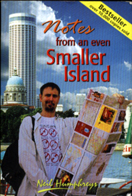 |
Notes from an even Smaller Island These 3
books are about the people and life in Singapore over a period of 10
years. They are not travel books though. The author Neil Humphrey's is
from Dagenham in Essex and gained a First Class Honours degree in
history. He decided to travel and was invited to stay with a
Singaporean friend in Singapore. He found a job teaching English but
then moved on to journalism with the Today newspaper and lived in a
high rise flat in Toa Payoh for all the time he was in Singapore. |
 |
|
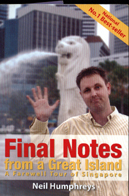 |
|
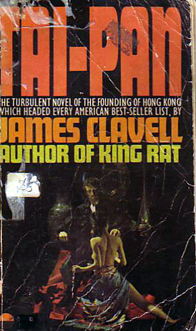 |
Tai-Pan
|
|
The Ultimate Aphrodisiac
|
|
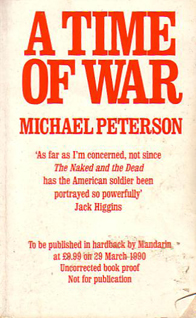 |
A Time of War by Michael Peterson
|
|
SS - GB by Len Deighton
|
|
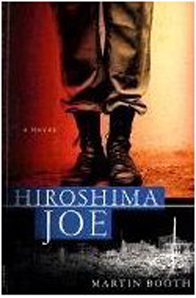 |
Hiroshima Joe by Martin Booth
He was captain Joseph Sandingham of the Royal Signals. Stationed in
Hong Kong during the winter of 1041. But on Christmas Eve his platoon was ambushed
by the Japanese, and he was sent to the living hell of a POW camp in
Kowloon. |
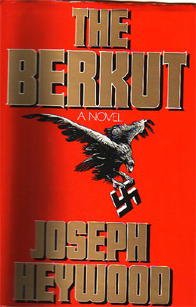 |
The Berkut by Joseph Heywood
SS man Colonel Gunthur Brumm, his faithful NCO, Sergeant Rau, and Adolf Hitler are on the run from Stalin's Special Operations Group headed by Petrov--the Berkut--after staging Hitler's supposed suicide. |
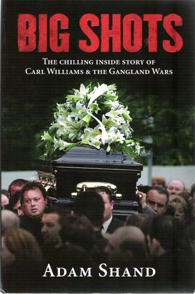
|
Big Shots - the chilling inside story of Carl Williams and the gangland wars, This
book covers the story of Melbourne's gangland wars, only recently
settled, at least temporarily, with the death of 25 hoodlums and
jailing of several major players including Mick Gatto, head of The
Carlton Crew, and Carl Williams, boss of the Sunshine boys. Sunshine is
a small country town outside Melbourne which spawned many violent
criminals who joined and/or took on the Establishment of Melbourne's
underworld. |
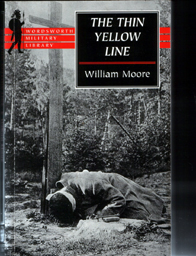 |
The Thin Yellow Line
|
|
Empire Made Me by Robert Bickers.
|
|
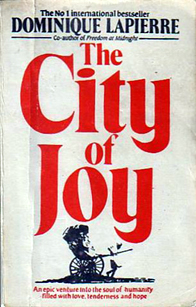 |
The City of Joy Read by Doc
City of Joy, quite simply, is the most evocative book I have ever read. For those readers who have seen the film, it bears no relationship to the book except in the vaguest sense. The characters have been changed and it does not tingle the senses in the same unforgettable way. Life in Calcutta is portrayed in such fine detail that when the sewers overflow in the monsoon rains, you actually smell the stench. You can see the children picking over the rubbish tips, taking home their findings, the families living in the streets, and the bicycles all but run over your toes. By the end of the book, it is all one can do not to hop on the first plane to India to help the poor unfortunates who make up such an appreciable part of the city. In the opening chapters, I had to be a little tenacious to give the tale time to unfold, but after that, I did not want to stop until the book was finished - and I was left wanting more, much more. |
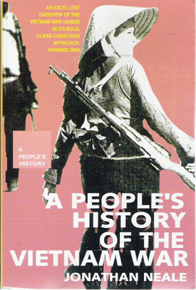 |
A People's History of the Vietnam War by Jonathan Neale Reviewed by Martin Ratia
Jonathan Neale holds a PhD in social history and was a
self-confessed conscientious objector to the Vietnam War. He is still
actively involved in protest movements against "capitalism"
worldwide. That background clearly influences his opinions and selection
of quotes from key players throughout the book.
Neale's perspective on the Vietnam War and related
world events is a goldmine for the conspiracy theorists who already
believe that the US government is primarily interested in
protecting its hold on global economic and military power by
setting the "ruling classes" and "working classes"
against each other.
Nevertheless, I found this book to be the most
comprehensive coverage of relevant US and world events, government
policies and social "revolution" leading up to, during and
subsequent to the Vietnam War that I've read to date.
To quote Mike Marqusee on the book's cover:
"If you're new to the history of the war in Vietnam, this is the
place to start. And if you think you've heard it all, then this is the
place to start again." Hear, hear!
|
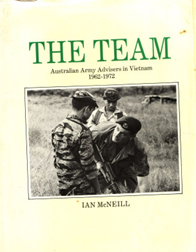 |
The Team by Ian McNeill Read by Doc Written with complete access to Australian dept of defence records and supported with personal interviews by the author. The team provides a close insight into the Vietnam conflict and recounts a fascinating chapter in Australia's military history. Available literature on the Vietnam war focuses overwhelmingly on the role of the allies, yet it was the Vietnamese who suffered its full force. This their story and that of the Australian advisors who fought with them. The Australian Army Training team Vietnam consisted mainly of officers and Warrant officers experts in jungle warfare. From an original 30 in July 1962, the team expanded to 100 in 19 65 I was one of them] and reached over 200 before withdrawing in 72. Working individually and in small groups, members operated with the South Vietnamese Army, the territorial forces, the US special forces and in programmes sponsored by the US CIA. Many worked close to the people in the provinces and districts, The experiences of the Team reveal the deep divisions which existed within South Vietnam, which with the allied withdrawal led to its collapse. Stories of the heroism and sacrifice of the Australian advisers are many, four Victoria Crosses, together with many other awards distinguish The Team as probably the most highly decorated unit, for its size in the history of the Australian Army. The story reflects the bond which developed between American and Australian advisers. It exposes the clashes too, as different approaches to counter insurgency were exacerbated under the stress of battle, cover photo shows WO Locky Snowcroft training montagnards at us special forces camp at Pleiku,1969 |
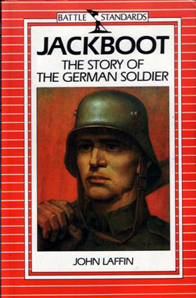 |
Jack Boot Those of us who served in Germany probably think we understand the German psyche well but we don't understand his military psyche. Reading this book by Australian historian John Laffin will help. Apart from that this book is full of interesting information like when the Germans occupied France they charged them £3,000,000 a day for the cost of the occupation, what a bloody cheek !
He seems a bit too fond of the Teuton
for me , but, still a good read .
|
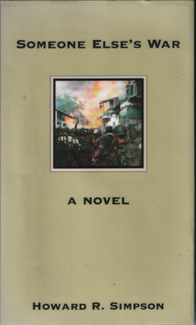 |
Someone Else's
War Reviewed by Tony
Not many people know more about Viet Nam
than this author. He worked for the US Information Agency during the
first Indo China War and was re assigned there for the second.
This book is a novel about Spooks mainly set in Nha Tran and Saigon so
those familiar with the locations will get a little extra out of the
book. A good solid story written around true events ,expertly analysed
and woven into the book .
See how many
" real " characters you can spot.
|
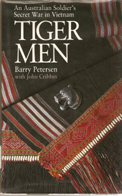 |
Tiger
Men By Barry Petersen Reviewed by Martin Ratia Subtitled “An Australian soldier’s secret war in Vietnam”, this book is written in the first person and tells of young Army captain Barry Petersen’s trials and tribulations as a member of the AATTV (Australian Army Training Team Vietnam) working for the CIA to set up the Truong Son Force, or Tiger Men, to resist the Viet Cong in the Central Highlands. Petersen understandably became very close to the Montagnard (ethnic minority mountain people) as he trained them to become a very effective fighting force. But politics will always prevail in war, and Petersen was eventually removed by the CIA – possibly because he was too successful and unwittingly became a “cult personality” amongst the Montagnard, thereby potentially undermining direct CIA control of the region. He did a second tour of Vietnam some five years later, as officer in charge of C company, 2 RAR, operating combat patrols around Nui Dat. Petersen served in Malaya before being posted to Vietnam, and found himself back in Port Dickson years later on loan to the Malaysian Army for training purposes. Even then, he became entwined in more intrigue as the resurgent communists tried to bribe him for military secrets. I was very taken with this book, not just for the references to service in Malaya which anyone on this site will be familiar with, but mainly because it gives detailed insider’s account of CIA involvement in the Vietnam War. The result is not always comforting reading! |
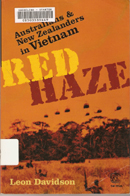 |
Red Haze
By Leon Davidson Reviewed by Martin Ratia This is a book about Australian and New Zealand forces in the Vietnam War. The title refers to what’s seen through infra red gunsights at night. Sadly, heat spots highlighted like this were not always made by Viet Cong; innocent women, children and animals show up the same way. But that didn’t stop “anonymous” heat spots being blasted by heavy calibre machine guns or napalm if they were breaking the after-dark curfew. Unlike most books of this genre, the author doesn’t claim any active involvement in the war. Instead, he presents a well-researched account of Australian and New Zealand forces in Vietnam, and any tendency towards “blandness” is well compensated by many direct quotes from those who served, such as Sergeant Bob Buick, D Coy, 6RAR: “There was usually one tracer to five normal rounds and the tracer was like a swarm of bush flies around us. You could not put your hand up without getting your fingers shot off .” I found this one of the most interesting books I’ve read about the Vietnam War – it covers many angles, including events that led to the war, and a chapter called “The Other Side” which documents viewpoints and quotes from those who fought against America and its allies. The author makes no judgments about right or wrong, save only to acknowledge that, like so many other wars, this one was also a tragic waste of life. |
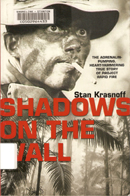 |
Shadows On The Wall
By Stan Krasnoff Reviewed by Martin Ratia Captain Stan Krasnoff joined the Australian Army Training Team Vietnam (AATTV) in December 1967 and was immediately attached to Project Rapid Fire, under US “hard man” Major Bo Gritz. Working in platoon-size teams with a small number of US special forces advisors and their Cambodian troopers (affectionately called “Bodes”), these guys led a life of sleep deprivation and continual stress as they faced life and death in the jungle on a daily basis, often face to face with the enemy, as they conducted their covert, intelligence-gathering missions so vital to the war effort. This is a real “up close and personal” account of the war from a combat trooper’s perspective, best described on the cover as “The adrenalin-pumping, heart-yammering true story of Project Rapid Fire” – but told from the backdrop of the author’s favourite coffee shop, Sandy’s Deli on Hastings Street, Noosa, on Queensland’s Sunshine Coast, which makes the whole experience even more realistic and chilling because Sandy’s is a popular spot and I may have sat on the next table to this guy in the past without realising a thing! |
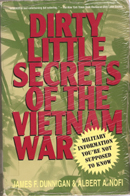 |
Dirty Little Secrets of the Vietnam War
By James F Dunnigan & Albert A Nofi Reviewed by Martin Ratia There are certainly some “dirty little secrets” in this book, written by two prolific authors of books and articles on military affairs (Dunnigan was a consultant to the State Dept, CIA and Army War College; Nofi is editor of the series The Great Campaigns of Military History), such as the involvement of various third parties on both sides including Russians, Cubans and Chinese – not to mention the roles played by Cambodia, Laos and Thailand and, by inference, their governments. But this book is much more than a collection of dirty little secrets – it’s a comprehensive breakdown of facts and figures covering everything from strategic thinking behind various campaigns and deployments to the numbers and types of weapons and other equipment used. A chapter near the end also gives a breakdown of every military unit on both sides of the war, including origin, numbers, battles engaged and area of operation. It even provides breakdowns of deserters including their educational, geographic and (so unusual in this day and age) colour! If, like me, you played no part in this war but have an interest in it, you will learn a lot more from this book than all the other more personal “war stories” put together which, by necessity, usually only cover certain aspects of the war. This book is well worth a read for anyone with an “academic” interest in the Vietnam War – particularly the “American phase” 1964–1972! |